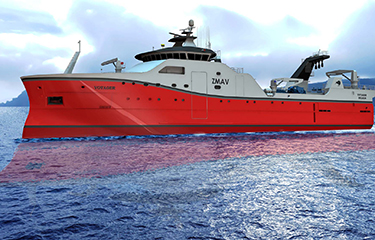SeafoodSource is closely following seafood processing and equipment innovation by compiling a regular round-up of updates from the sector.
- Inverness, Scotland-based aquaculture equipment and technology supplier Gael Force Group has announced a partnership with Dutch shipyard Nauplius Workboats to construct a range of SeaFeed steel feed barges.
The partnership with Nauplius will allow Gael Force to expand its barge-building capacities and offer customers favorable delivery times, with a competitive package offering on steel barges, it said.
“Along with our own team’s experience in design and build, Nauplius’ levels of technical knowledge and overall experience in the sector offer us complete confidence that this partnership will bolster our robust and reliable range of feeding barges for fish farming,” Gael Force Group Managing Director Stewart Graham said in a release. “As both companies are running a lean cost base and are very efficient producers we believe we have a high quality and highly competitive offering. While this increases our production capacity to meet strong demand and we envisage this to be of great benefit to our Scottish customers, there is also potential for us to service our international customers, particularly those producers in Norway, Iceland and the Faroes.”
The structural build of the steel barge hulls, surface treatments, and painting will take place in Groningen, the Netherlands. Then the barges will be towed to Inverness, Scotland, for mechanical and electrical full fit-out and installation for the SeaFeed systems, Gael Force said.
“We are immediately building two 400-metric-ton(MT) SeaFeed barges with one already pre-sold to a major Scottish salmon producer, which we will be able to announce later this month. There are a number of other customers already interested in the second build,” Graham said.
The barge range covers up to 800 metric tons MT in feed capacities and the ability to accommodate options for hybridized power with secondary machinery processes.
“We are delighted to be partnering with Gael Force on this long-term collaboration in support of the aquaculture sector in Scotland, and overseas. Our ship design and build quality is already widely appreciated and we are pleased to bring our expertise into this partnership,” Nauplius Technical Director and Naval Architect Gerrit Knol said.
- The Government of Canada and Province of New Brunswick have granted funding support from the Atlantic Fisheries Fund (AFF) to True North to expand its processing plant in Saint George, New Brunswick, Canada.
The funding is a repayable contribution of over CAD 6.7 million (USD 5 million, EUR 4.6 million), covering projects valued at over CAD 15.6 million (USD 11.6 million, EUR 10.7 million). True North, a part of Cooke Aquaculture, said it will use the funding to expand its plant in Saint George, New Brunswick, and improve overall productivity. Cooke said the move will help consolidate its local salmon processing capacity.
"This new and improved equipment will allow True North Salmon to continue delivering high-quality salmon products that Cooke Aquaculture is known for while ensuring good jobs remain in our coastal communities,” Canada Minister of Fisheries, Oceans, and the Canadian Coast Guard Diane Lebouthilier said in a release. “The seafood industry is the heartbeat of the Atlantic Canadian economy and expansions like this one are essential to Canada's ongoing success as a world leader in delivering fresh and high-quality seafood products."
- Nelson, New Zealand-based seafood company Talley’s announced a contract with Seattle, Washington U.S.A.-based seafood processing company Carsoe to design and construct a new muiltispecies factory on board one of its new vessels in New Zealand.
The new factory, Carsoe said in a release, will come with a high degree of automation that allows for its catch to be processed and quickly frozen on board.
“Automation makes the processing job easier for the crew,” Talley’s Project Manager Warren Harris said in a release. "When we compared the Carsoe design with others, we saw that Carsoe's design flowed a lot better. Also, their communication regarding the specifications and our requirements has been second to none.”
The onboard factory, the company said, is designed to be streamlined across multiple species and will minimize heavy lifting and manual labor, improving working conditions for the crew. The catch can be processed quickly, frozen onboard, and ready for fillet distribution with a capacity of up to 80 metric tons per day, Carsoe said.
Photo courtesy of Carsoe







